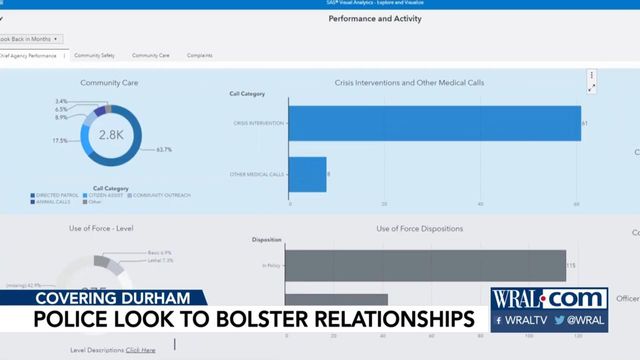Durham police, SAS incorporating data to analyze officer response patterns
Several databases, including community complaints made against an officer, use-of-force investigations and police reports, feed into a SAS program and provide "a holistic approach."
Posted — UpdatedThe solution for some police departments, including Durham's, is data.
The Durham Police Department is among several around the country partnering with cary-based SAS Institute, piloting a program – at no initial cost to taxpayers – to look at officer response patterns.
"We can actually gain a lot more insight other than who is at risk or what officers are trending in arrests towards a risk category," said Steve Shirley, the director of SAS' Customer Advisory, Justice & Public Safety Group. "We can also learn about stresses of the job and how that affects wellness."
Several databases, including community complaints made against an officer, use-of-force investigations and police reports, feed into the program and provide what Shirley calls "a holistic approach."
Police administrators and supervisors can look at several layers of macro and micro data, ranging from the department as a whole to units within down to the individual officers. The tool allows higher-ups to analyze how often officers are responding to certain calls or initiating contact with the community and, when they’re on the beat, how they respond to situations.
"Overall, what we're looking to do is, from that policy level all the way down to the officer level, is to bring all that synergy together," said Juan Colon, national director for Opioids and Illegal Drugs Solutions at SAS. "With all the data, [we want] to have a better understanding of what's going on, to provide officers the resources that they need, and ensuring that we're changing the policing culture, one officer at a time."
While Colon is part of the SAS team developing this tool, he’s also a former New Jersey State Police officer who says he’s been shot at and had a child die in front of him.
"I wish that something like this existed so that the supervisors could recognize that I was being affected by these incidents," he said.
Colon said he believes analyzing data points related to police behavior can and will lead to systemic criminal justice reform.
Dustin Chicurel-Bayard, a spokesman for the American Civil Liberties Union of North Carolina, released the following statement after learning more about the program:
SAS officials said the program should be operational with the Durham Police Department in the next two months. Police Chief C.J. Davis will address the new technology at a virtual forum next week.
Related Topics
• Credits
Copyright 2024 by Capitol Broadcasting Company. All rights reserved. This material may not be published, broadcast, rewritten or redistributed.





